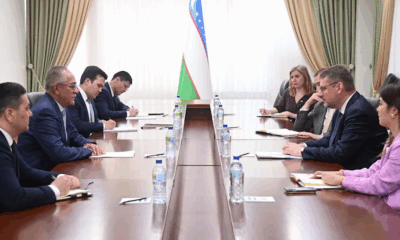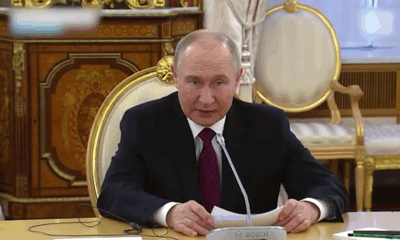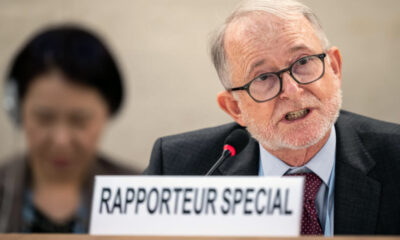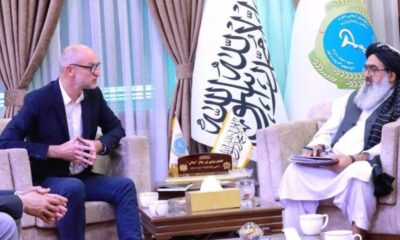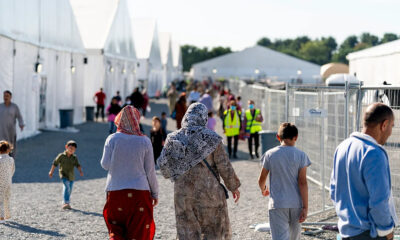Business
UAE set to run Kabul airport in deal with IEA: sources
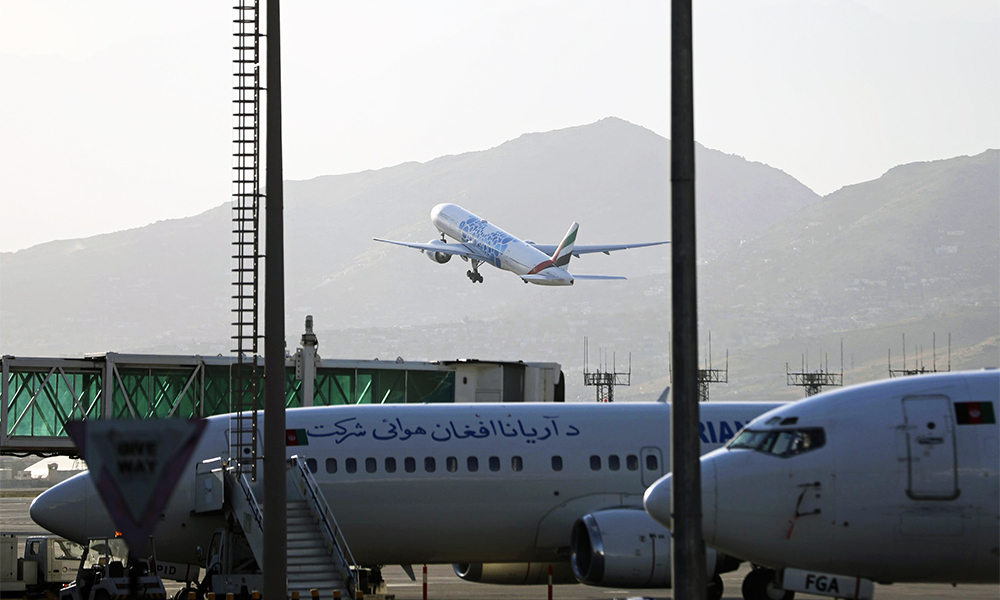
The Islamic Emirate of Afghanistan (IEA), and the United Arab Emirates are poised to strike a deal for the Gulf nation to run Kabul airport and several others in Afghanistan that could be announced within weeks, according to sources familiar with the negotiations, Reuters reported.
According to the report the IEA, whose government remains an international pariah without formal recognition, have courted regional powers, including Qatar and Turkey, to operate Kabul airport, landlocked Afghanistan’s main air link with the world, and others.
But after months of back-and-forth talks, and at one point raising the possibility of a joint UAE-Turkey-Qatar deal, the IEA is set to hand the operations in their entirety to the UAE, who had previously run Afghan airports, the sources said.
An agreement would help the IEA ease their isolation from the outside world as they govern an impoverished country beset by drought, widespread hunger and economic crisis. It would also hand Abu Dhabi a win in its diplomatic tussle with Qatar for influence, Reuter’s story read.
Under the deal with the UAE, Afghans will be employed at the airports, including in security roles, crucial for the IEA who want toshow they can create jobs but also because they staunchly oppose the presence of foreign forces, sources said.
According to Reuters an Emirati state-linked contractor had been contracted to provide security services, which should be announced soon, while negotiations over airspace management are ongoing, they said.
The IEA in May awarded the ground services contract to UAE state-linked GAAC, which was involved in running security and ground handling services at Afghan airports before the IEA takeover, shortly after IEA officials had visited Abu Dhabi.
Meanwhile, Qatar and Turkey’s joint negotiations with the IEA broke down around the same time, sources said.
Emirati officials had no immediate comment when contacted by Reuters. GAAC did not respond to a request for comment.
An IEA transport ministry spokesman confirmed an aviation security contract had already been signed with the UAE but said the air traffic contract was not finalised or confirmed yet, Reuters reported.
There is little direct commercial benefit in the airport operations, but Kabul airport would provide a key source of intelligence on movements in and out of the country, Western officials say.
The sources said UAE airlines, which have not flown to Afghanistan since the IEA takeover last year, were expected to resume flights to Kabul and possibly other Afghan airports after the deal was finalized, read the report.
Other airlines, who too have stayed away, could also again operate flights if the UAE deal can address substantial security concerns, including the threat posed by the Afghan branch of the Islamic State whose targets have included the IEA.
In the months leading up to the ground services being awarded to the UAE, the IEA repeatedly made unexplained changes to its team negotiating with Qatar and Turkey, the sources said.
Then the IEA sought to alter agreed terms by upping airport fees and taxes and weaken Qatar and Turkey’s control over revenue collection, they added.
A Qatari official had no immediate comment when contacted by Reuters. A Turkish official, speaking on condition of anonymity, confirmed talks with the IEA had stopped “some time ago”.
The UAE’S efforts are part of a quiet but assertive push by Abu Dhabi to expand longstanding ties with the IEA that have included government aid and diplomatic efforts in the months since the IEA took power in August.
Western officials say Abu Dhabi sees Afghanistan, which shares a large land border with UAE’s Gulf neighbour Iran, as part of its wider backyard and so believes it has legitimate interests in the country’s political and economic stability, Reuters reported.
But those officials also say the UAE is keen to counter the influence in Afghanistan of Qatar, a Gulf state lauded by Western nations for serving as gateway to the IEA but a rival of Abu Dhabi’s in a contest for regional influence.
Western officials worry that rivalry is now playing out in Afghanistan. The UAE, along with Saudi Arabia, Egypt and Bahrain, cut ties with Qatar from 2017 until 2021 as part of a long-running, bitter dispute between the two rich Gulf states that was largely resolved last year.
Qatar has hosted the IEA’s political office in Doha, long one of few places to meet the IEA and where the United States negotiated with the IEA to withdraw from Afghanistan.
Qatar also helped run Kabul’s Hamid Karzai International Airport after the collapse of the Western-backed government last year. Its state-owned Qatar Airways operated charter flights and Qatari special forces provided security on the ground.
But Qatar’s relationship with the IEA now appears strained, according to Western officials who say the IEA have become wary of being too dependent on any one nation.
Business
US and China reach deal to temporarily slash tariffs, easing slump fears

The United States and China have agreed to temporarily slash reciprocal tariffs in a deal that surpassed expectations as the world’s two biggest economies seek to end a damaging trade war that has stoked fears of recession and roiled financial markets.
The U.S. will cut extra tariffs it imposed on Chinese imports in April this year to 30% from 145% and Chinese duties on U.S. imports will fall to 10% from 125%, the two sides said on Monday. The new measures are effective for 90 days, Reuters reported.
The dollar rose and stock markets lifted following the news, which helped allay concerns about a downturn triggered last month by U.S. President Donald Trump’s escalation of tariff measures aimed at narrowing the U.S. trade deficit.
“Both countries represented their national interest very well,” U.S. Treasury Secretary Scott Bessent said after talks with Chinese officials in Geneva. “We both have an interest in balanced trade, the U.S. will continue moving towards that.”
Striking a conciliatory tone towards China, Bessent was speaking alongside U.S. Trade Representative Jamieson Greer after the weekend talks in Switzerland in which both sides hailed progress on narrowing differences.
“The consensus from both delegations this weekend is neither side wants a decoupling,” Bessent said. “And what had occurred with these very high tariffs … was the equivalent of an embargo, and neither side wants that. We do want trade.”
The tariff dispute had brought nearly $600 billion in two-way trade to a standstill, disrupting supply chains, sparking fears of stagflation and triggering some layoffs.
The Geneva meetings were the first face-to-face interactions between senior U.S. and Chinese economic officials since Trump returned to power and launched a global tariff blitz, imposing particularly hefty duties on China.
Bessent said the deal did not include sector-specific tariffs and that the U.S. would continue strategic rebalancing in areas including medicines, semiconductors and steel where it had identified supply chain vulnerabilities.
The accord went further than many analysts had expected following weeks of confrontational rhetoric on trade.
“This is better than I expected. I thought tariffs would be cut to somewhere around 50%,” said Zhiwei Zhang, chief economist at Pinpoint Asset Management in Hong Kong.
“Obviously, this is very positive news for economies in both countries and for the global economy, and makes investors much less concerned about the damage to global supply chains in the short term,” Zhang added.
REPRIEVE
Since taking office in January, Trump had hiked the tariffs paid by U.S. importers for goods from China to 145%, in addition to those he imposed on many Chinese goods during his first term and the duties levied by the Biden administration.
China hit back by putting export curbs on some rare earth elements, vital for U.S. manufacturers of weapons and electronic consumer goods, and raising tariffs on U.S. goods to 125%.
Shares in European firms hit by the trade war rallied after the deal. Shipping company Maersk was the biggest gainer in Europe, up more than 12%. It warned last week that container volumes between the U.S. and China had plunged due to the dispute.
Meanwhile, shares in luxury firms LVMH and Gucci-owner Kering were up 7.4% and 6.7% respectively.
U.S. planemaker Boeing did not respond to requests for comment on how the deal would affect deliveries of aircraft to Chinese customers. In April, it said it was looking to resell potentially dozens of planes locked out of China by tariffs.
Wall Street stock futures climbed as the talks boosted hopes a global recession might be averted.
Trump gave a positive reading of the talks before they had concluded, saying the two sides had negotiated “a total reset… in a friendly, but constructive, manner.”
The president levied the tariffs in part after declaring a national emergency over fentanyl entering the United States, and Greer said conversations over curbing the deadly opioid were “very constructive” though on a separate track.
U.S. and Chinese officials met over two days at the Swiss U.N. ambassador’s gated villa overlooking Lake Geneva. Greer said many of the most challenging issues were settled outside, sitting on patio furniture beneath the shade of a tall tree.
“Having this setting, as opposed to … a sterile hotel conference situation or conference rooms, I think, let us develop personal relationships with our counterparts and lead to the successful conclusion,” he said.
Business
Pakistan’s exports to Afghanistan rise by over 64% in 9 months
Overall exports to Afghanistan were recorded at $623.285 million during July-March (FY2024-25) against exports of $378.922 million during the same period last year.
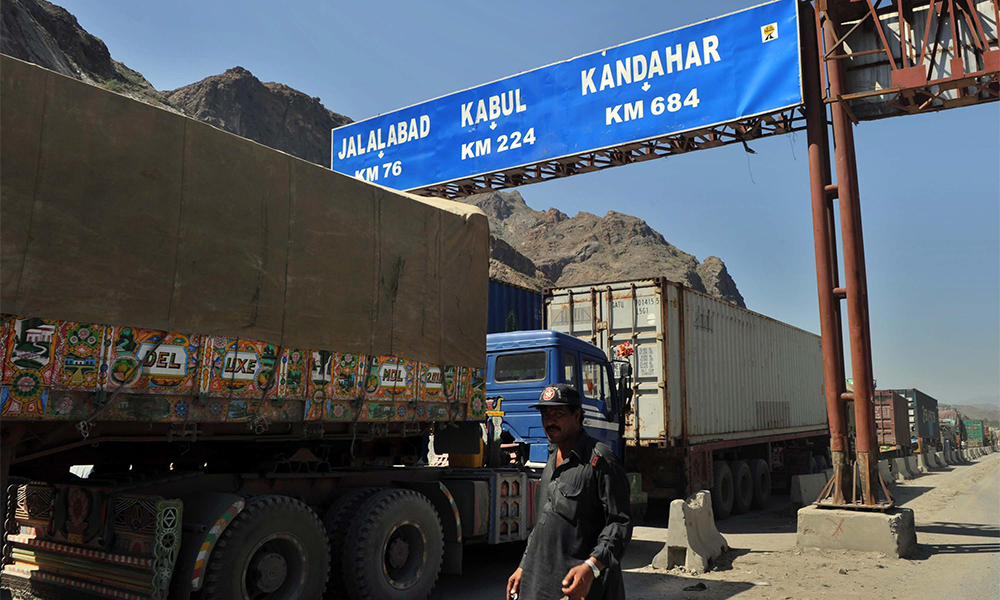
Pakistan has reported that its export of goods and services to Afghanistan witnessed an increase of 64.48 percent during the first nine months of the fiscal year (2024-25) as compared to the exports of the corresponding period of last year.
According to the State Bank of Pakistan (SBP), the overall exports to Afghanistan were recorded at $623.285 million during July-March (FY2024-25) against exports of $378.922 million during the same period last year.
On a year-on-year basis, the exports to Afghanistan decreased by 45.54 percent from $55.907 million in March 2024, against the exports of $30.445 million in March 2025.
On a month-on-month basis, the exports to Afghanistan also dipped by 15.37 percent during March 2025 as compared to the exports of $35.977 million in February 2025, the SBP data revealed.
On the other hand, the imports from Afghanistan into the country during the months under review were recorded at $20.127 million against $6.438 million last year, showing an increase of 212.62 percent in July-March (2024-25).
On a year-on-year basis, the imports from Afghanistan witnessed an increase of 99.79 percent, going up from $0.960 million in March 2024 against the imports of $1.918 million in March 2025.
On a month-on-month basis, the imports from Afghanistan into the country also witnessed a decrease of 36.23 percent during March 2025, as compared to the imports of $3.008m during February 2025, according to the data.
Business
Chinese company keen to invest $50 million in automobile industry in Afghanistan

Chinese automobile company Dongfeng has expressed an interest to invest $50 million in Afghanistan.
A representative of the company said in a meeting with Ahmadullah Zahid, Deputy Minister of Industry and Commerce, that the company wants to invest $50 million in the automobile manufacturing sector in Afghanistan in four phases over a period of three and a half years.
He added that with this investment, 2,000 vehicles will be manufactured per year.
Welcoming the company’s interest in investing in the country Ahmadullah Zahid, the Deputy Minister of Industry and Commerce, described Afghanistan as one of the safe and secure places for investment with favorable profits.
He assured the Chinese that all domestic and foreign investors will be treated equally and will be fully supported.
In the meeting, the representative of Dongfeng also emphasized that the company’s investment in Afghanistan will create jobs for 500 to 700 people in the country.
He said that the company’s products will include cars, trucks, ambulances, and buses.
-

 Regional5 days ago
Regional5 days agoIndia says military stations attacked by Pakistan drones and missiles
-
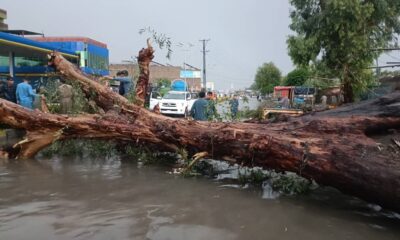
 Latest News5 days ago
Latest News5 days agoOne dead, dozens injured as powerful storm strikes Jalalabad, Afghanistan
-

 Latest News4 days ago
Latest News4 days agoEx-Afghan deputy speaker Qadeer back in Kenyan court for criminal case
-

 Health5 days ago
Health5 days agoJapanese charity Peshawar-Kai to resume leprosy treatment in Afghanistan
-

 Sport5 days ago
Sport5 days agoIndia suspends Indian Premier League T20 cricket tournament
-

 Latest News4 days ago
Latest News4 days agoPakistan says India launched attack on Afghanistan, India denies
-

 Latest News4 days ago
Latest News4 days agoMCC Chief: Afghan cadres sent to China for AI training
-

 World3 days ago
World3 days agoUS offers to help India and Pakistan start talks, G7 also urges dialogue


